
Khamenei is Responsible for Turning COVID-19 Into a National Catastrophe, say Activists
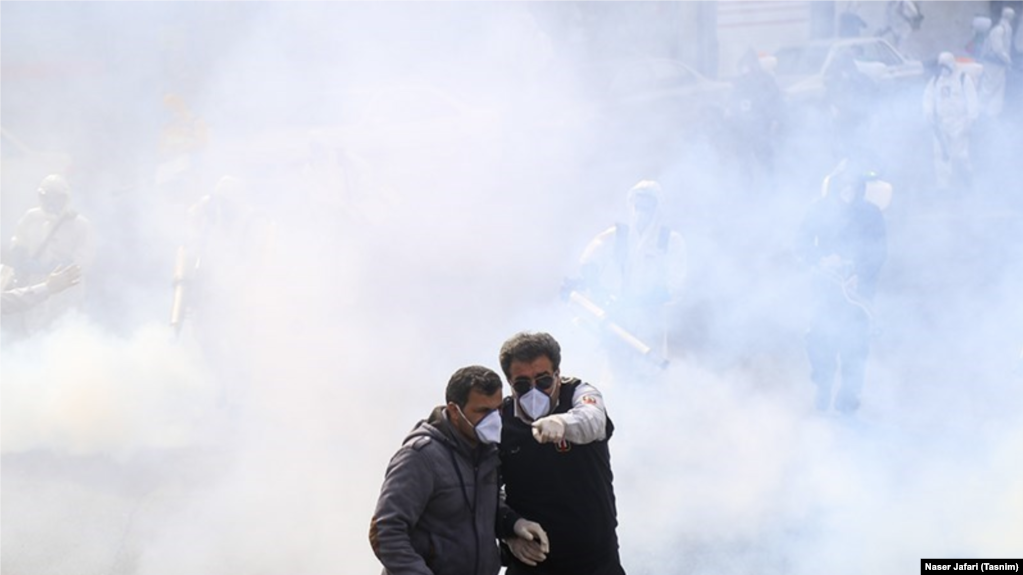
100 civil and political activists issued a statement asserting that the Islamic Republic’s Supreme Leader Ali Khamenei is mainly responsible for turning COVID-19 into a national catastrophe.
They also hold President Hassan Rouhani responsible in this regard, saying he has “contributed to intensifying this process by joining Mr. Khamenei in hiding facts and linking the coronavirus crisis to conspiracies.”
These activists argue that the Islamic Republic’s establishment and security forces kept silent on the coronavirus outbreak to encourage people to take part in the parliamentary elections and the anniversary of the 1979 Revolution, hence losing an opportunity to contain this dangerous virus on time.
The statement cited Ali Khamenei calling the virus a “possible biological attack” and his remarks on “jinns assisting Iran’s enemies” as well as the dismissal of the organization Doctors Without Borders from Iran. In addition, the statement said, “each and every Iranian citizen is a hostage of the supreme leader, his advisors and military-security forces while the government, too, obeys this policy.”
Khamenei recently spoke about the US involvement in the coronavirus outbreak in Iran and called for setting up headquarters to combat the coronavirus and raised the possibility of a “biological attack” against Iran. In the same vein, he alluded to collaboration between two kinds of enemies in his speech on this issue: humans and jinns: “We have lots of enemies…There are both jinn and human enemies and they help each other. The intelligence services of many countries team up against us.”
The writers of this statement also put the National Development Fund under the spotlight, asking the questions: “Should it be spending on the Quds Force instead of investing in public health?” and “Why has this economic institution under Ali Khamenei’s supervision not allocated funds to fight the coronavirus outbreak?”
The statement then asked: “Why does the supreme leader, his security forces and the judiciary under his command put obstacles in the path of releasing all political prisoners and at the same time arrest those who contribute to the free flow of information under these conditions?”
The activists also criticized the Islamic Republic’s establishment for its refusal to ban trips in the country during the coronavirus crisis: “How come an establishment that suppresses the smallest protest is unable to control and minimize traffic within cities as well as inter-city travels?”
According to an official tally published by Iran’s Health Ministry, 2,620 have died from COVID-19 in the county; however, Radio Farda reports that at least 4,298 people have lost their lives due to the coronavirus.
Ortagus: Iran can Spend From Khamenei’s Fund to Deal With the Coronavirus
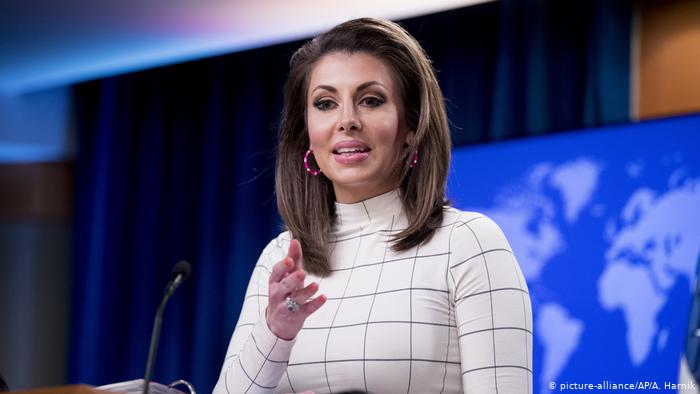
The US State Department spokesperson reacted to Iranian officials calling for US sanctions to be revoked by accusing them of “lying and stealing,” adding that billions of dollars are in the possession of the Iranian supreme leader that can be used to fight the coronavirus disease.
Morgan Ortagus in a tweet to Iranian officials said, “Stop lying. Stop stealing. If the Iranian regime needs funds to deal with the coronavirus, it can access billions in Khamenei’s tax-free hedge fund.”
The US State Department spokeswoman is pointing to huge institutions that operate under the Iranian Supreme Leader Ali Khamenei, one of which – Headquarters for Execution of Imam Khomeini’s Order – was said to be worth $95 billion in 2013.
Ortagus’ tweet was in reaction to the Islamic Republic’s officials, including Foreign Minister Mohammad Javad Zarif, calling for US sanctions to be lifted. Zarif recently complained on his Instagram page about combating sanctions and the coronavirus at the same time as well as how the present predicament would cause the suffering of the Iranian people to double. In his note, Zarif called the US sanctions during the coronavirus a “war crime.”
Meanwhile, Iranian academics and civil and political activists say that it is the Iranian government that has added to the death toll from the coronavirus disease by preventing the Iranian people from receiving international assistance, not releasing political prisoners, detaining journalists, and promoting superstition on Iranian state television instead of raising awareness regarding this virus. They consider the high death toll from the coronavirus disease a result of the initial secrecy of the Islamic Republic and its security forces.
Similarly, hundreds of Iranians from within the country – mostly physicians, nurses, healthcare workers, and civil and political activists – wrote a letter to the head of the World Health Organization pointing to the negligence of the Islamic Republic in confronting the coronavirus outbreak.
Designing and Producing new Centrifuges During the Coronavirus Crisis
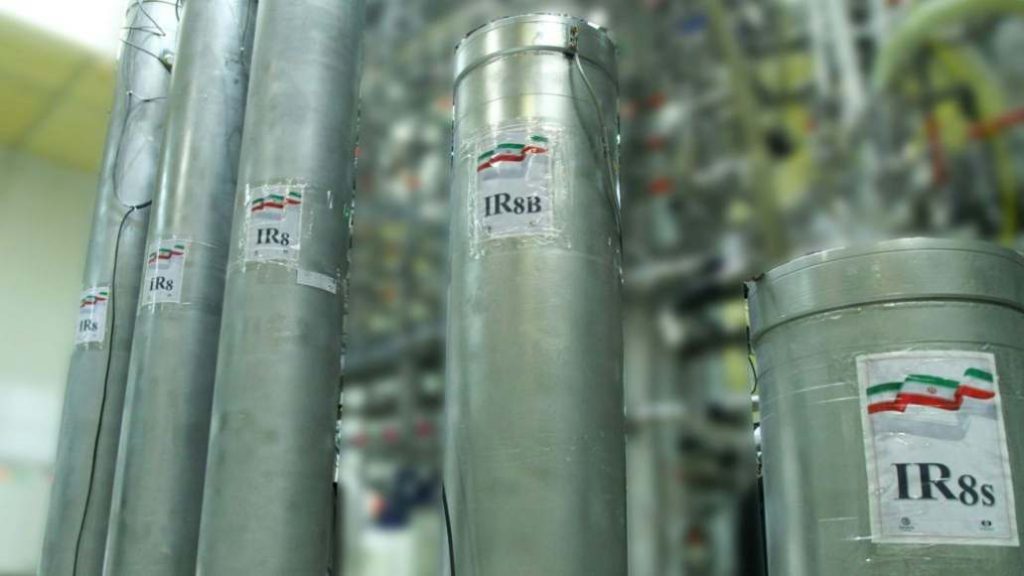
While the coronavirus outbreak in Iran has reached a critical point and most governmental organizations and institutions have stopped their activities, Iran’s nuclear activities still continue.
According to ISNA, a new generation of centrifuges were designed and produced during Nowruz (the Iranian New Year holiday) and will be unveiled soon.
The Iran Centrifuge Technology company announced this, adding that designing and producing a new generation of centrifuges – IR-9 – was completed during Nowruz in the city of Natanz “in line with the peaceful policies of Iran’s Atomic Energy Organization.”
It is said that the centrifuges are at the stage of mechanical testing and are twice as powerful as the IR-8 centrifuges.
Earlier, the United Nations had reacted to the Islamic Republic’s nuclear activities, such as the launching of advanced machines to accelerate the process of uranium enrichment, emphasizing that such measures were indicative of Iran moving away from the nuclear deal and expressed regret in this regard.
The Islamic Republic continues its nuclear activities while facing a severe shortage of funds to combat the coronavirus. It asked the IMF for a $5 billion loan. Meanwhile, during the coronavirus pandemic, Iranian Foreign Minister Mohammad Javad Zarif and Iran’s propaganda machine overseas launched a pressure campaign on America to revoke its sanctions, claiming that the US sanctions prevent Iran from fighting the virus.
The IAEA had earlier announced that the Islamic Republic has three unannounced nuclear sites where nuclear activities have been carried out. According to secondary reports, the Iranian government has not allowed IAEA inspectors to visit these sites.
The First Financial Transaction Between Iran and Europe Through INSTEX
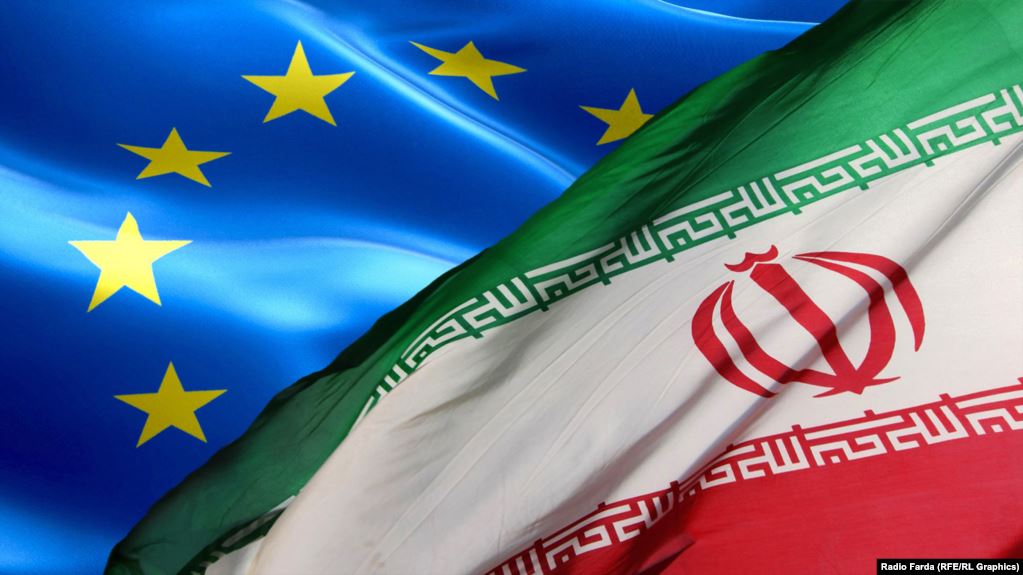
The German Foreign Ministry announced on Tuesday that for the first time, Iran used INSTEX for purchasing and transferring medical equipment from Europe. According to the German Foreign Ministry, the first shipment of medical items has been sent from Europe to Iran.
INSTEX, the German Foreign Ministry added, is for sustainable, long-term, legitimate trade between Iran and Europe, and aims to preserve the nuclear deal with Iran.
France, Germany, and Britain launched INSTEX to facilitate financial transactions with Iran despite US sanctions. INSTEX was registered in 2018 and some other European countries later joined it. But no financial transaction had been made through this platform.
These three countries had earlier announced that they had offered to send Iran 5 million euros to fight the coronavirus outbreak, saying that they would also send medical items including masks, medical gloves and lab equipment.
Josep Borrell had also said last week that the European Union will give 20 million euros to help Iran.
The first transaction of medical items has taken place, while Iran has consistently complained about INSTEX not being launched. Last year, in protest against the US pulling out of the nuclear deal and Europe not being committed to its obligations within the deal, Iran reduced its nuclear obligations.
After the outbreak of the coronavirus, Iranian officials protested that the US sanctions have prevented Iran from receiving necessary medical aid.
US Secretary of State Mike Pompeo had earlier mentioned that the United States has no problem with humanitarian goods being transferred to Iran via INSTEX. However, Brian Hook, US Special Representative for Iran, warned that if INSTEX is used for facilitating illegal transactions with Iran, this financial channel will also be sanctioned by the United States.
Islamic Republic’s Media on Israeli Jinns
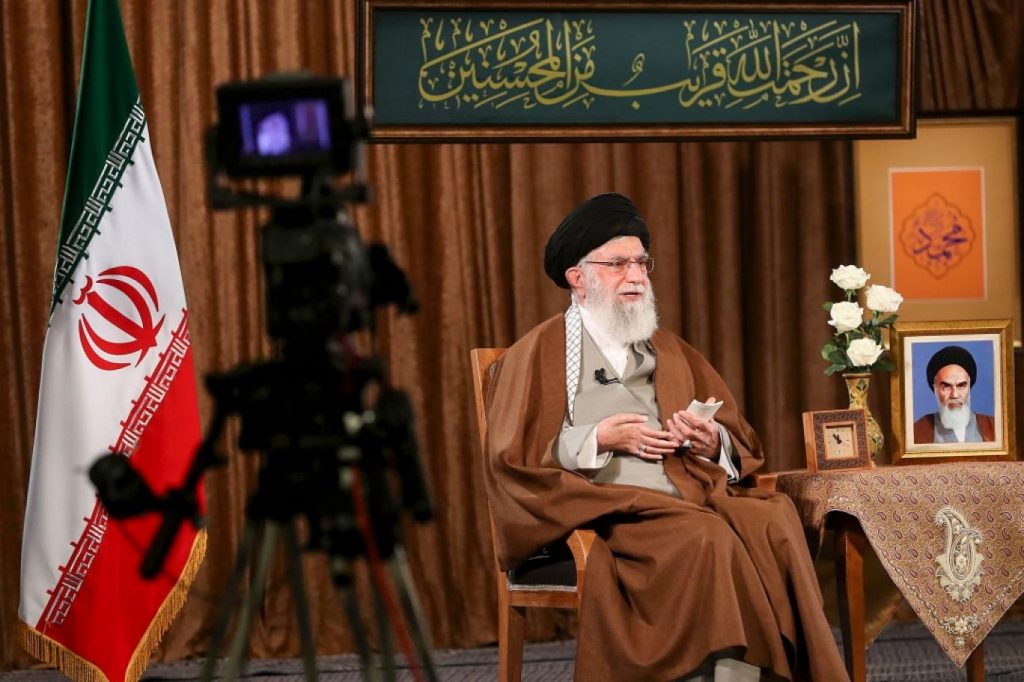
Recently, Iranian Supreme Leader Ali Khamenei, in his speech at the beginning of the Iranian New Year, made odd claims about the role of metaphysical forces in creating chaos in Iran.
In his speech, Khamenei referred to a verse from the Holy Quran saying, “the Islamic Republic has both jinn and human enemies and these two help each other.” He further claimed that the intelligence services of other countries are helping each other to confront the Islamic Republic.
In publishing the supreme leader’s speech, the Islamic Republic’s official media did not mention Khamenei’s remarks referring to metaphysical forces and jinns.
But an internet magazine, Negar, produced and released by the supreme leader’s website, later pointed to the metaphysical forces and their hostile role against the Islamic Republic.
With regard to the supreme leader’s remarks about jinns, a so-called religious scholar said that “there is no doubt that Jews and Zionists have a long record in metaphysical issues and relations with Satan and jinns,” claiming that “undeniably Israel’s espionage systems also use these forces.”
The Islamic Republic’s officials have a long history of talking about metaphysical forces, even though such remarks have never been directly attributed to anyone in Iran’s government. In other words, such remarks are usually made by religious officials.
In recent years, the propagandists of the Islamic Republic have tried to tie metaphysical concepts to present-day politics. For example, Ali Akbar Raefipour, a self-styled expert of society and religion, recently reiterated the supreme leader’s position with regard to metaphysical forces and their presence in the world of politics.
“Leap in Production:” Wishful Thinking or Strategy?
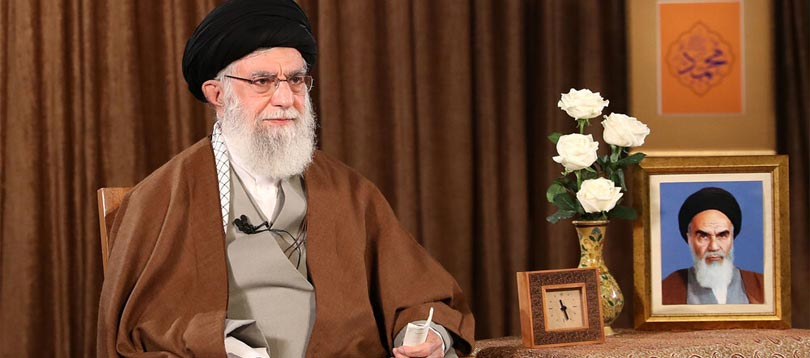
Iranian Supreme Leader Ali Khamenei named the Iranian New Year as “the year of the leap in production” which led some celebrity artists and “reformist” politicians to criticize and question why Khamenei had chosen this slogan. The criticism led to a harsh reaction from the supreme leader’s supporters. Even an actor – Amir Noori – who had made fun of this slogan was arrested and forced to apologize.
The judicial branch’s deputy threatened that those who create impediments in achieving Khamenei’s slogan will be confronted by the judicial branch. For 30 years, the supreme leader has assigned a slogan to the Iranian New Year, but it had never faced public taunting and criticism. So why has this year’s slogan – “leap in production” – become so controversial?
The process of naming years by Khamenei is not transparent at all, which means that there is no council or entity that would transparently study and suggest a slogan to the leader. Some of Khamenei’s loyalists say that the naming of each year is a strategic move.
But others believe that these slogans indicate the existence of a parallel institution in the country which makes strategic decisions. Whether this institution is run by the leader himself or a committee within the “leader’s office,” it shows that there are invisible, unidentified institutions that are planning and working to realize Khamenei’s wishes.
Experts hold that strategic decision-making can come to fruition when it is consistent with other large-scale decisions in the country. But evidence shows that during Khamenei’s leadership, the institutions under him have repeatedly breached such large-scale decisions.
Facts show that the strategy of beginning each Iranian year with a new slogan by Iran’s supreme leader has failed. Economic experts maintain that the price of the national currency, the rate of inflation, economic growth, and corruption in the country all expose the supreme leader’s wishful thinking.
The Islamic Republic Criticized for Keeping Silent on the Coronavirus Outbreak and Cyber Activists are Arrested
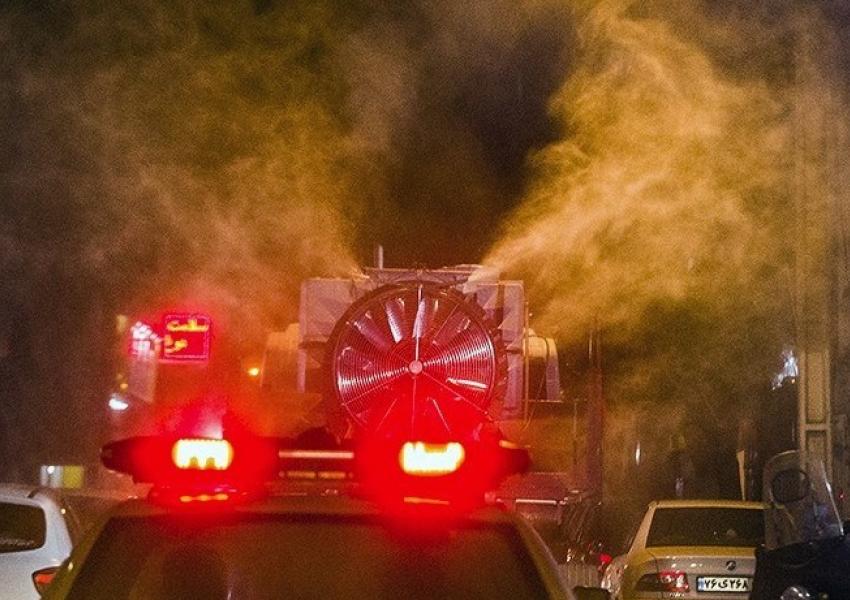
The Islamic Republic’s establishment has been under fire recently for keeping quiet on the coronavirus epidemic in Iran. Meanwhile, judicial and police officials have arrested anyone who has published reports on the coronavirus outbreak.
Police officials in Gilan and Hormozgan provinces announced that they have taken 20 individuals into custody for disseminating “rumors” and “agitating materials.”
At least 50 more individuals from minority communities residing in East Azerbaijan and Kurdistan provinces have been arrested since the beginning of this week as well.
Moreover, 15 people were arrested in Gilan, Esfahan and West Azerbaijan in the first three days of the Iranian New Year.
According to Hossein Amirli, Iran’s cyber police (FATA) deputy commander, 998 incidents of cybercrime had been identified. 316 criminal acts had led to a legal case.
It was recently reported that the administrator of a major news site in Iran was taken into custody after tweeting that nearly 2,000 people lost their lives due to the coronavirus outbreak in the country. He had also urged Iran’s health minister to announce the “real” statistics to the people.
A member of the Shiraz city council was also arrested for criticizing the government on social media for the way it dealt with the coronavirus outbreak.
Iran’s Medical Council to Rouhani: Declare the Coronavirus Tally Honestly and Clearly!
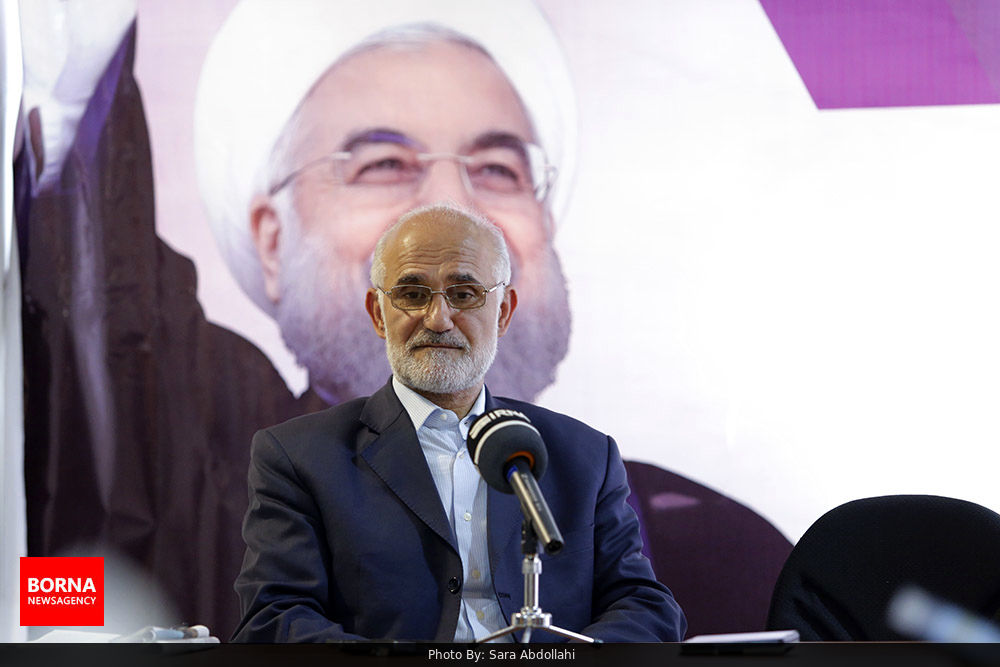
Mostafa Moein, head of the Islamic Republic’s Medical Council, has written a letter to President Hassan Rouhani asking him to declare the coronavirus tally in the country “honestly and clearly.”
In his letter, Moein said in order to “make decisions based on facts,” the statistics must be announced “precisely and by provincial breakdown.”
This official continued: “The fact that 3,000 people get infected with the coronavirus on a daily basis in Iran indicates that the government has not been able to use the opportunity of the new year’s holidays to deal with this disease.”
Moein also noted that medical staff in Iran have not had enough protection when dealing with the coronavirus. Therefore, the number of victims among them is much higher than in other countries.
The head of the Islamic Republic’s Medical Council advised Rouhani to avoid misrepresenting the country’s conditions as “pseudo-normal” and refrain from “creating a fake sense of security.”
